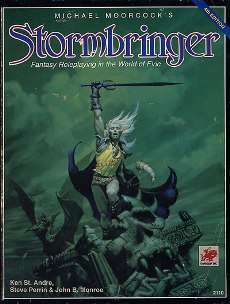Stormbringer (role-playing game)
Stormbringer is a fantasy role-playing game published by Chaosium set in the world of the Young Kingdoms, based on the Elric of Melniboné books by Michael Moorcock. The game takes its name from Elric's sword, Stormbringer (though one edition was published as Elric!) and uses the Basic Role-Playing game system, a percentile-dice-based system used in many role-playing games designed by Chaosium.[1]
 Stormbringer 4th edition box cover, 1990. Illustration by Michael Whelan, 1977. | |
| Designer(s) | Ken St. Andre, Lynn Willis et al. |
|---|---|
| Publisher(s) | Chaosium |
| Publication date | 1981 (1st edition) 1985 (2nd edition) 1987 (3rd edition) 1990 (4th edition) 1993 (Elric!) 2001(5th edition) |
| Genre(s) | Fantasy |
| System(s) | Basic Role-Playing |
System
The game uses a version of the Basic Roleplaying system originally developed for Chaosium's RuneQuest fantasy RPG, but has different rules for magic and other setting-specific elements. The first three editions are functionally similar, while the fourth edition changed the magic system extensively. Elric! was a substantial reworking of the game, and Stormbringer fifth edition is the Elric! rules with additional material from several older, out-of-print supplements incorporated.
History
The game has evolved through several editions over the years:
- 1st edition (1981) by Ken St. Andre; boxed set
- 2nd edition (1985) by St. Andre; boxed set
- 3rd edition (1987) by St. Andre, published jointly with Games Workshop
- 4th edition (1990) by St. Andre, Steve Perrin, and John B. Monroe; boxed set
- Elric! (1993) by Lynn Willis, Richard Watts, Mark Morrison, Jimmie W. Pursell Jr., Sam Shirley, and Joshua Shaw.
- The adventure The Bronze Grimoire (1994) for use with Elric!
- 5th edition (2001) by Lynn Willis
Chaosium no longer produces new books for the Stormbringer roleplaying game.[2] In August 2007, Mongoose Publishing published the Elric of Melniboné RPG by Lawrence Whittaker, which is based on Moongoose's first edition of RuneQuest, though it was itself discontinued when Mongoose's license ended.[3]
Reception
Murray Writtle reviewed Stormbringer for White Dwarf #29, giving it an overall rating of 7 out of 10, and stated that "So, if you want to have single death or glory adventures in the Young Kingdoms, Stormbringer will give you them, but to get a continuing campaign underway will take a certain amount of rewriting and careful thought."[4]
In a 1996 poll of readers conducted by Arcane to determine the 50 most popular roleplaying games of all time, Stormbringer was ranked 25th. Editor Paul Pettengale commented: "A simplified RuneQuest, only set in Elric's world. It captures the spirit of the books, but to play it properly you really need to be familiar with the novels, and they are of the type of fantasy that you either love or loathe."[5]
Reviews
- Different Worlds #38 (Jan./Feb., 1985)
- White Dwarf #92
- White Wolf #21 (June/July, 1990)
- White Wolf #39 (1994) - Elric!
- Casus Belli #38 (June 1987)
- Casus Belli #39 (Aug 1987)
References
- Writtle, Murray (February–March 1982). "Open Box: Stormbringer". White Dwarf (review). Games Workshop (29): 15. ISSN 0265-8712.
- "Stormbringer – Chaosium Inc". Chaosium. Retrieved 6 November 2007.
- ISBN 978-1-905850-13-6, see Elric of Melnibone RPG series
- Writtle, Murray (February–March 1982). "Open Box". White Dwarf. Games Workshop (Issue 29): 15.
- Pettengale, Paul (Christmas 1996). "Arcane Presents the Top 50 Roleplaying Games 1996". Arcane. Future Publishing (14): 25–35.
External links
- Stormbringer! – a website supporting all editions of the Stormbringer RPG